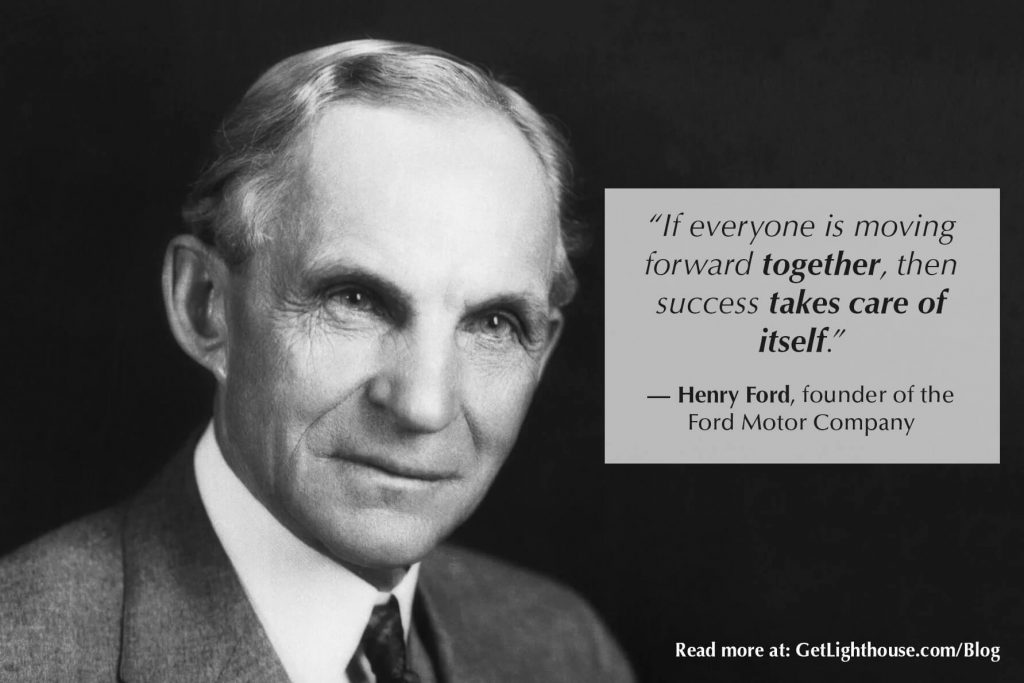
If you’ve ever gotten this response from your team, you know how damaging it can be when your team doesn’t actually understand where you’re trying to go.
It can lead to everyone trying to go in different directions, people not understanding why their work matters, and your team lacking motivation to hit your goals.
You’re in (not so) good company
It turns out, this is a very common problem. As we did research for today’s post, we found some devastating stats:
All of this translates to a simple truth: Most companies and teams aren’t spending enough time on their strategy, and communicating it effectively to their teams.
That’s why today we’re focusing on how you can work on your strategy with your team. We’ll be covering everything you need to both see what your team thinks your strategy is, and how to involve your team in developing new strategies that help you win.

Does your team know your strategy? If the data we just reviewed is any indication, most likely your team doesn’t.
That’s why you should take the time to talk about your team’s vision and objectives. When your team understands them, they’re more likely to focus on the right tasks, and be more motivated to do their work, because they know why their work matters.
And a big part of ensuring your team understands a strategy is asking them about it.
These questions encourage your team members to think about their contributions in a strategic context and understand how their daily tasks fit into your bigger picture.
You can try asking these in a group meeting, or for more precise results, try asking these in your 1 on 1s; then you’ll know who on your team does and does not understand the strategy most:
Remember that these questions may get you surprising answers. It’s not until you ask that you find out what your team really thinks.
If you find you’re not as on the same page as you hoped, don’t get upset. Instead, recognize you have work to do to get your team on the same page and focused on the right things for your company’s strategy.

No business operates in a vacuum. That means external factors greatly impact your chances of success.
Fortunately, once everyone understands your strategy, you and your team can bring your unique insights and perspective to help make the strategy even better.
This section focuses on how you can look outside your company and turn to your team to augment and improve your strategy. Because we all know a strategy is only as useful as the execution of it.
Many of these strategic questions could leave your team with more questions than answers, and that’s a good thing! It challenges you and your team to do the hard work to really understand your market and think about how it can apply to and improve your strategy.
This is the kind of work that can make all the difference in winning or losing in a competitive market. It can also rally your team to all help contribute to making it a success, because you’re involving them in the process.

Every team has its challenges and issues, and no one knows them better than the people experiencing them every day.
Rather than hide from them, or ignore them completely, great leaders recognize that you have to incorporate them in your strategic plans. Otherwise, they can easily interfere with achieving your goals.
To avoid hamstringing your efforts, take the time to talk to your team about what they see as your challenges. Not only can they often clearly explain problems, but if you listen to them, they often will have valuable ideas and input that can help overcome them or adapt your strategy to account for them.
The right conversation at the right time can make all the difference in making your team more productive and more likely to help hit your strategic goals.
Here’s some of those strategic questions you can ask:
The key with these strategy session questions is to get your team thinking and talking.
You can see the first few are about simply getting your problems, their concerns, and challenges you face hitting your strategic goals all out in the open.
From there, you are able to start to talk about solutions and alternative options.
Then, finally, you push your team to get creative and think without your normal constraints. This is often where the boldest and most innovative ideas come from. Leave room for your team to share things that even you may think “will never work.”
You may be surprised what good ideas can come from things that sound impossible at first.
Further reading:

Does your team work well together? Do they collaborate, share ideas, and support each other?
Or is everyone territorial, with sharp elbows, and combative personalities?
How your team works together can be just as important to the success of your strategy as how brilliant the plan is. Effective teamwork and clear communication are the backbone of any successful team.
And while this should be self-evident, the data shows just how big a difference having a collaborative team really makes:
So while communication and collaboration may seem unrelated to hitting your strategic goals, it really matters.
That’s why we have a whole set of questions for you focused solely on this:
While some of these sections you could ask in a group setting, these questions are best asked individually in your 1 on 1s with your team members. That’s because if there are problems, or there’s a negative reaction to any of these, it’s much easier to get real candor and understand the heart of the problem in private.
Keep in mind you may not like everything you hear when asking these strategic questions. Try to keep an open mind, and don’t get defensive. The goal is listen and source ideas to get better.
If you’re not sure if you can apply an idea as presented, work with them on how you could test it or adapt it to your concerns. You may be surprised how accommodating your team members can be when they feel heard, and you’re willing to at least try something different. That’s how real innovation starts happening.
Further reading:

Without customers, you don’t have a business. It doesn’t matter what kind of product or service your company offers, you have customers that you need to serve, and hopefully satisfy.
Knowing this basic truth, that means that your strategy isn’t complete without taking into account how it impacts your customers.
Remembering to include this step in considering your process can really pay off:
Sounds like a pretty solid impact, right?
Fortunately, your team can be a great source of customer insights…but only if you ask!
Try some of these strategic questions to keep a pulse on your customer’s needs, and learn how you and your team could improve customer satisfaction with your product/service/offering:
It’s easy to put a poster on the wall, a quote in an all hands, or words on a slide deck about how customer focused you are. Yet, none of that leads to actually caring about, nor serving, your customers.
That’s why it’s important to take time to talk to your team about your customers.
The act of asking is enough to signify to your team that it’s important. Then, these types of strategy session questions can get everyone thinking about ways to keep your customer front and center as you develop and execute on your strategy.
Are you talking about your customers enough?
You can unlock a wealth of potential insights, knowledge, and ideas from your team. All you have to do is take the time to ask them.
If you do so with a mindset of wanting to listen and learn, you may be surprised by what you hear.
The right idea can transform a team, an initiative, or a strategic goal from something that feels impossible, to making a massive, positive impact.
Next time you’re talking about your company’s strategy, make your team really feel a part of the process, and ensure they really understand the strategy by asking some of these questions.
And if asking strategic questions like these feels foreign and uncomfortable, start by learning how to become more curious, and practice being an effective listener. You can unlock a whole new world as a leader when you are both of those things.


Learn something today? Share it so your friends can, too: